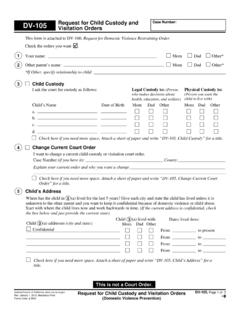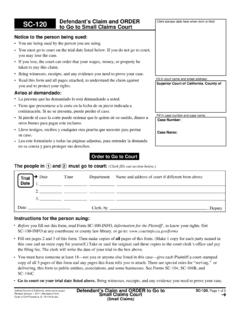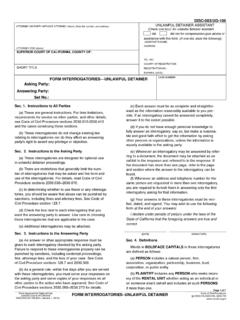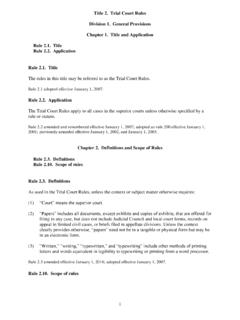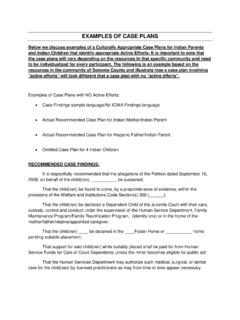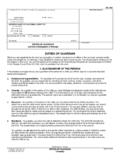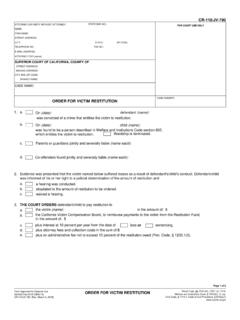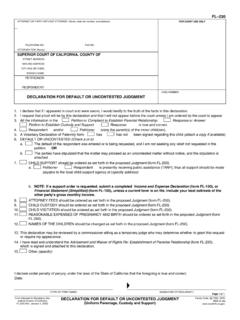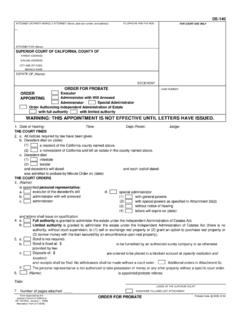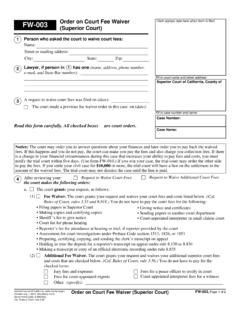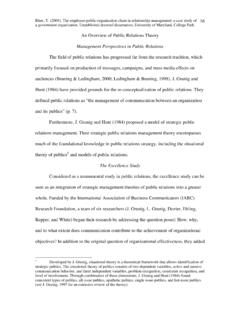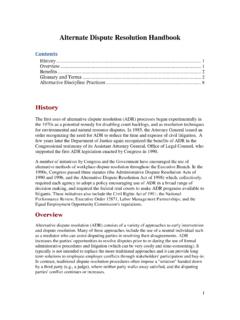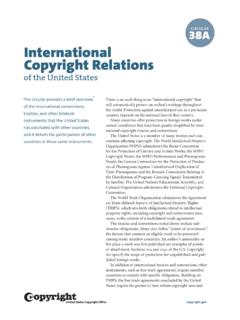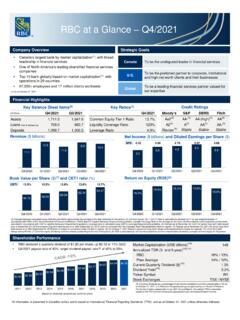Transcription of AN OVERVIEW OF ADMINISTRATIVE HEARING PROCEDURE
1 AN OVERVIEW OF ADMINISTRATIVE HEARING PROCEDURE Prepared by the ADMINISTRATIVE Agency Committee of the california Access to Justice Commission In california , when an individual or business disagrees with a government agency s action, that action can be challenged. This is done by asking the agency for an ADMINISTRATIVE HEARING . ADMINISTRATIVE law hearings are less formal than court-room trials. ADMINISTRATIVE law judges (ALJs) run the hearings. They are neutral judicial officers who conduct hearings and settlement conferences. If you do not win, you can ask the superior court to review the HEARING decision. This is called a writ of mandate. You may contact the agency that you are having a problem with and ask how to review the agency s action.
2 A list of agencies and their web sites appear at the end of this discussion. Some california ADMINISTRATIVE agencies, such as the Department of Motor Vehicles, and the Department of Social Services, run their own hearings, and they have their own procedures . Some agencies, however, have independent appeals boards. For example, the california Unemployment Insurance Appeals Board (CUIAB) is independent from the Employment Development Department (EDD), the agency that decides whether you should receive unemployment or disability benefits, or whether you should be required to pay state taxes. CUIAB ALJs do not work for the EDD. They do not have to follow technical rules of evidence and PROCEDURE , and they are required to conduct the hearings to make sure that the substantial rights of the parties are protected Cal.
3 Unemp. Ins. Code section 1952. The CUIAB ALJs have a duty to develop the record (which means to find out what the facts are) through evidence, which consists of your testimony, witnesses testimony, and documents (paper, and audio or video recordings). CUIAB ALJs also will ask questions of you and your witnesses and help you ask questions of witnesses. You may have anyone, even someone who is not a lawyer, represent you at the HEARING . CUIAB s web site has a video of a mock HEARING that shows how that agency conducts its hearings. The local offices also have an ALJ on duty to answer your questions about evidence and procedures . If you don t agree with the ALJ s decision, you may appeal it to the CUIAB Appeal Board with a simple letter at no cost to you, but you have to mail it or deliver it in person to the local CUIAB office no later than 20 days from the mailing date stamped at the bottom of the decision.
4 If you lose the appeal and the Appeal Board sides with the ALJ, you must file a writ of mandate in the Superior Court within six months of the Appeal Board s decision. Other state and local agencies contract with and pay the Office of ADMINISTRATIVE Hearings (OAH) to handle their appeals. OAH is an agency within the Department of General Services that runs ADMINISTRATIVE hearings for over 1,400 1state and local government agencies. The agency may adopt the ALJ s decision or issue its own new decision. OAH is divided into two divisions: the General Jurisdiction Division and the Special Education Division. OAH also has alternative dispute resolution and mediation services, which work to find a settlement agreeable to both sides. Click here < > to find out more about the OAH.
5 This web site also has a link to the ADMINISTRATIVE PROCEDURE Act (the Government Code) that provides rules for certain hearings. Certain agencies are required by statute to provide language assistance in hearings. These include CUIAB, State Board of Barbering and Cosmetology, State Department of Developmental Services, Franchise Tax Board, State Department of Health Services, Department of Housing and Community Development, Department of Industrial Relations, State Department of Mental Health, Department of Motor Vehicles, Public Utilities Commission, Office of Statewide Health Planning and Development, State Department of Social Services, Workers Compensation Appeals Board, Department of Insurance, State Personnel Board and Department of the Youth Authority.
6 Be sure to let the agency know if you need an interpreter. Because of the high number of agencies who contract with OAH, a detailed discussion of OAH s procedures follows. The discussion of how to conduct a HEARING , however, should be helpful to you in any agency HEARING . OAH procedures . 1. OAH Pre- HEARING procedures . OAH handles hearings that are under the state ADMINISTRATIVE PROCEDURE Act, and hearings that are under another statute setting out the minimum requirements for due process. OAH handles appeals for child support, Regional Center Services and Special Education, as well as appeals involving licenses and disciplinary actions. At a minimum, an agency must give a person notice and an opportunity to be heard, including the opportunity to present evidence and rebut evidence.
7 Cal. Gov t Code (a)(1). The agency must also make available a copy of the governing procedures available to the person against whom the agency action is directed, and state whether the state APA applies (Cal. Gov t Code 115000). Agencies may include provisions more protective of the rights of the person to whom the agency action is directed. The presiding officer s decision must be in writing, must be based on the record, and include a statement of the factual and legal basis of the decision. Cal. Gov t Code (a)(6).The presiding officer may be subject to disqualification for bias prejudice or interest, and is prohibited from ex parte communication. Child support hearings are often done 2by telephone, and you have to ask for an in-person HEARING if you want one.
8 You may have to wait longer for in-person HEARING to be scheduled. Special education cases involve experts and are usually conducted in person. Check with the local office issuing the HEARING notice as to the procedures followed for the HEARING . 2. OAH Hearings under the State APA If the state wishes to take away your license, such as a contractor s license, day care license, or barber license, or the agency wants to discipline you for some you did wrong while operating your licensed business, the agency will send an accusation or a statement of issues, depending on the type of case. You are called the Respondent. The agency is required to provide certain information to you as the respondent. If the HEARING is to determine whether your license or other right or privilege should be revoked, the accusation must list the rules that you are supposed to have violated, and state how you violated those rules.
9 If the HEARING is one to determine whether you should get a license or other right or privilege, the agency must give you a statement of issues that lists the rules you should have complied with in order to obtain the license, right or privilege. You must ask for a HEARING in writing within fifteen days of the mailing date of the accusation or statement of issues. This is called a notice of defense. You may be represented by a lawyer at your own expense, but not at public expense. You may also represent yourself. You may bring a friend or other person to assist you at the HEARING . An interpreter will be provided at the HEARING without charge to you. Witnesses and Evidence: You also have the right to get the names and addresses of witnesses that will testify at the HEARING if you have a licensing or other type of HEARING if the state ADMINISTRATIVE PROCEDURE act applies to your case (which it does if it s a licensing or discipline case).
10 You also get to review and to copy the agency s evidence. The agency also has to give you a copy of the discovery rules so you can get evidence you need for your case. The agency must make a copy of the governing procedures (the rules that say how the HEARING will be held) available , but it is not required to affirmatively offer or provide it. That means you may have to look it up on the web site or go to the local office to read a copy. Within 30 days, both you and the agency are entitled to the names and addresses of all known witnesses, including witnesses the other side does not intend to call at the HEARING . You may also ask to see reports made by or on behalf of the agency, any statements made by any party relating to the subject matter of the HEARING , and any witness statements.
